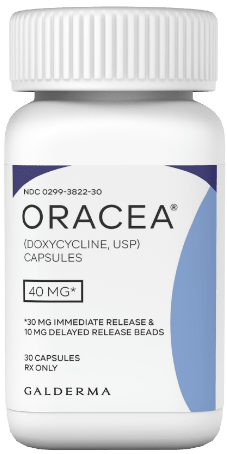AVAILABLE resources
For more thought leadership on Rosacea, visit Galderma’s medical news and practice management hub:
Rosacea Awareness Month
It's Rosacea Awareness Month; Here’s how you can encourage your patients to get involved
In the News
Act now against Antibiotic Resistance: Protect Future Health
Designed to be different: A powerful, non-antibiotic dose
Rosacea Sufferers Can Help Combat Antibiotic Resistance
Clinical Studies
Two randomized phase III clinical trials evaluating anti-inflammatory dose doxycycline
Comparison of anti-inflammatory dose doxycycline versus doxycycline 100 mg in the treatment of rosacea
Rosacea: Beyond the visible report
Recommendations for rosacea diagnosis, classification and management
Patient Resources
Four reasons:
Why ORACEA Capsules can help
Practice Toolkits
Act now against Antibiotic Resistance

STAY CONNECTED
Sign up and
stay up-to-date
For the latest news, research, and insights into papulopustular rosacea, subscribe now! You’ll also receive patient resources and toolkits, helping you treat your patients throughout their rosacea journey
Important Safety Information
Indication: ORACEA® (doxycycline) 40 mg* capsules are indicated for the treatment of only inflammatory lesions (papules and pustules) of rosacea in adult patients. ORACEA does not lessen the facial redness caused by rosacea. Adverse Events: In controlled clinical studies, the most commonly reported adverse events (>2%) in subjects treated with ORACEA were nasopharyngitis, diarrhea, hypertension and sinusitis. Warnings/Precautions: ORACEA should not be used to treat or prevent infections. ORACEA should not be taken by patients who have a known hypersensitivity to doxycycline or other tetracyclines. ORACEA should not be taken during pregnancy, by nursing mothers, or during tooth development (up to the age of 8 years) and may cause reversible inhibition of bone growth. If Clostridium difficile associated diarrhea (CDAD) occurs, may need to discontinue ORACEA. Although photosensitivity was not observed in clinical trials, ORACEA patients should minimize or avoid exposure to natural or artificial sunlight. The efficacy of ORACEA treatment beyond 16 weeks and safety beyond 9 months have not been established.
You are encouraged to report negative side effects of prescription drugs to the FDA. Visit www.fda.gov/medwatch or call 1-800-FDA-1088.
*30 mg immediate release and 10 mg delayed release beads



